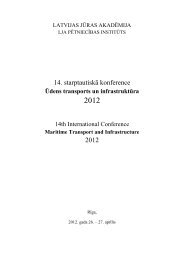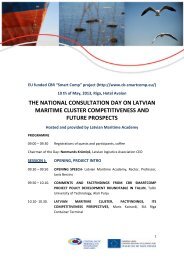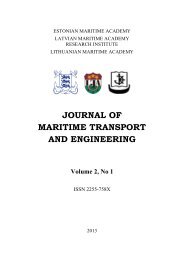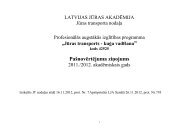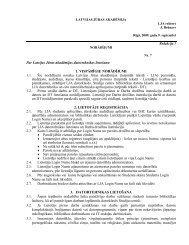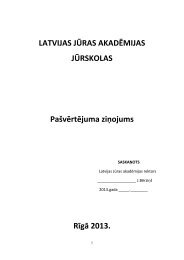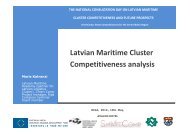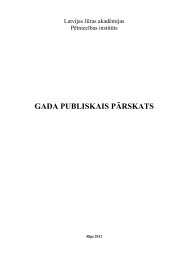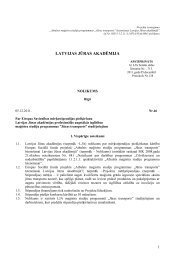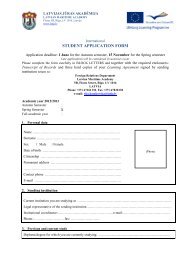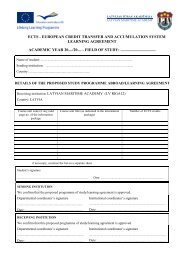Latvian Maritime academy
Latvian Maritime academy
Latvian Maritime academy
You also want an ePaper? Increase the reach of your titles
YUMPU automatically turns print PDFs into web optimized ePapers that Google loves.
Students have made a phenomenological reconstruction of the sea perception mechanism. They<br />
described and characterized the phenomenological reconstruction by the practicality, maturity and<br />
didactic elements from the point of view of the maritime self-concept. Students expressed a perception of<br />
importance of maritime medicine. Their maritime self-concept expresses the well-being, cognitive<br />
aspirations, wellness activity and feeling of the self-esteem at the level of maritime medicine. Most<br />
students have accentuated natural development of their professional maritime self-concept.<br />
Students have characterized their pre-studies level as recreation, inexpressive marine behavior and<br />
untrained self-esteem. <strong>Maritime</strong> studies expanded searches of the professional identity of students. They<br />
behave more mature and valuable at studies. The vocational choice is tested in a practice, which<br />
professional activity trains a personality of the student, stimulates positive emotions, cognitive aspirations<br />
of safety, adequate behavior and self-esteem mostly.<br />
If seafarers are prepared in conditions of higher education system, it is important to comply with an<br />
integral process, which consists of three phases of the maritime self-concept – pre-studies, studies and<br />
practice. It is appropriate to train students universally and so improve their maritime self-concept as a<br />
basis of the personality value in the maritime state. The civil and professional maritime self-concept<br />
should be improved at strategic, tactic and operative levels of the constructive cooperation of the<br />
government, businesses and educational institutions from the point of integral view of the maritime<br />
society.<br />
Conclusions<br />
1. European maritime self-concept was characterized from the historical – ideological point of<br />
view. The personal sense of existential freedom is not based on the transcendence at the ideological level<br />
in the pre-monotheistic epoch. The monotheistic leap of self-consciousness in the Jewish civilization has<br />
opened a transcendental perspective of the maritime self-concept. Christianity formed the classic<br />
European mentality, which led to development of the maritime self-concept, the rise of universities from<br />
monastic libraries, development of the maritime geographic discoveries, science, global and universal<br />
education and the first maritime schools. Later the maritime self-concept was characterized by the formal<br />
pragmatism, only empirical science and too active marine functionalism on developing of commercial<br />
maritime fleets from the ecological point of view.<br />
2. Psycho-educational factors of the maritime self-concept development were revealed. Intuitive<br />
and creative mythologization of marine events stimulates development of the maritime self-concept. A<br />
virtual level of the contact with the sea brings psychological influence on the maritime self-concept. The<br />
direct experience of the sea gives natural, ontological, anthropological and psychological basis to improve<br />
the maritime self-concept. Marine education of the health enriches the personality. The main valuable<br />
condition of the education consists from surviving of the personal constructive autonomy. Seafarer’s<br />
personality is enriched, when he / she studies at the higher school. The vocational choice is tested in a<br />
practice, which professional activity trains a personality of the student, stimulates positive emotions,<br />
cognitive aspirations of safety, adequate behavior and self-esteem mostly. Empirical results can be<br />
applied only to the respondent population.<br />
There are directions of the students’ maritime self-concept development:<br />
– Improvement of maritime studies programs of higher schools in regard to the human capital and<br />
importance of the adequate ideological and psychological culture of the personality in extreme<br />
conditions of seafarer’s work.<br />
– Development of inter-disciplinary integration at the level of the maritime self-concept culture in<br />
higher studies programs of seafarers, and textbooks, and improvement of methodological<br />
directions of educational work with maritime students.<br />
– Determination of the hodegetical direction, content and structure of the maritime self-concept<br />
education, and creative modeling of development of the maritime self-concept of personality at<br />
formal – professional and informal levels from the point of view of the maritime science<br />
popularization as general socio-educational influence.<br />
References<br />
1. A campaign to attract entrants to the shipping industry. 2008. Available (accessed on<br />
18.02.2012): http://www.imo.org<br />
2. Beresnevičius, G. Ant laiko ašmenų. Vilnius: Aidai, 2002.<br />
26



